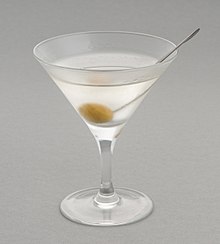Martini (cocktail)
| IBA Official Cocktail | |
|---|---|
 |
|
| The martini is one of the most widely known cocktails | |
| Type | Cocktail |
| Primary alcohol by volume | |
| Served | straight (or on the rocks) |
| Standard garnish |
Olive or lemon twist |
| Standard drinkware | Cocktail glass |
| IBA specified ingredients* | |
| Preparation | Straight: Pour all ingredients into mixing glass with ice cubes. Stir well. Strain in chilled martini cocktail glass. Squeeze oil from lemon peel onto the drink, or garnish with olive. |
| * Dry Martini recipe at International Bartenders Association | |
Olive or lemon twist
The martini is a cocktail made with gin and vermouth, and garnished with an olive or a lemon twist. Over the years, the martini has become one of the best-known mixed alcoholic beverages. H. L. Mencken called the martini "the only American invention as perfect as the sonnet" and E. B. White called it "the elixir of quietude".
By 1922 the Martini reached its most recognizable form in which London dry gin and dry vermouth are combined at a ratio of 2:1, stirred in a mixing glass with ice cubes, with the optional addition of orange or aromatic bitters, then strained into a chilled cocktail glass. Over time the generally expected garnish became the drinker's choice of a green olive or a twist of lemon peel.
A dry Martini is made with dry, white vermouth. By the Roaring Twenties, it became common to ask for them. Over the course of the century, the amount of vermouth steadily dropped. During the 1930s the ratio was 3:1, and during the 1940s the ratio was 4:1. During the latter part of the 20th century, 6:1, 8:1, 12:1, 15:1 (the "Montgomery"), or even 50:1 or 100:1 Martinis became considered the norm.
A dirty Martini contains a splash of olive brine or olive juice and is typically garnished with an olive.
A perfect Martini uses equal amounts of sweet and dry vermouth.
Some Martinis were prepared by filling a cocktail glass with gin, then rubbing a finger of vermouth along the rim. There are those who advocated the elimination of vermouth altogether. According to Noël Coward, "A perfect Martini should be made by filling a glass with gin, then waving it in the general direction of Italy," Italy being a major producer of vermouth.Luis Buñuel used the dry Martini as part of his creative process, regularly using it to sustain "a reverie in a bar". He offers his own recipe, involving Angostura bitters, in his memoir.
...
Wikipedia
